Or, “A-diggin’ in a polecat hole jest ain’t a smart idea.”
One year ago today, November 9, 2018, Elaine Seelhorst died at 6am just as the first snow of the season started to fall. I am one of her three children.
To honor her memory, I’m posting what she called her book: recollections of her childhood in eastern Kentucky where she grew up the oldest of five children. Mom started it when she was about 87, but writing was slow going with her failing eyesight and twisted fingers. It’s really good. I encouraged her to write more, and am sorry I didn’t find the time to help her do it.
This is her title, her asides in brackets, and for the most part her spellings–I just gave it a light edit for consistency. The only thing I added is the alternate “polecat” title of the post, but only to keep you reading until you see what happened!
She was one of those ordinary people who had extraordinary traits. Hers was the ability to get up every day of her 91 years and try to make a difference in her world, even as her physical access to the world kept shrinking.
Mom developed severe rheumatoid arthritis in the early 1960s, when treatments and even diagnoses were hard to come by and not very effective. But even as she became more disabled, she helped educate others about arthritis and successfully lobbied governments to provide handicap access long before the Americans with Disabilities Act mandated it.
She decided to write her book using spellings that suggest the distinctive accent of that area, as her favorite author Jesse Stuart did in some of his books about that area. She later worked to “unlearn” her accent, and for a time had a love/hate relationship with the place of her birth. But in the end, she was proud of where she came from and the traditions and work ethic learned from her parents, Sena and Howard Burke.
We kids glimpsed the remnants of that life as we grew up. At some point after the events described here, they moved down the road to an old 7-room farmhouse with a root cellar, smoke house, tobacco barn, and an outhouse. They used well water and stoked a coal stove for heat. Grandma and Grandpa lived there into the 1980s. It was only torn down a few years ago.
Mom was born in Greenup County. But I’ll let her tell you. Rest in peace, Mom.
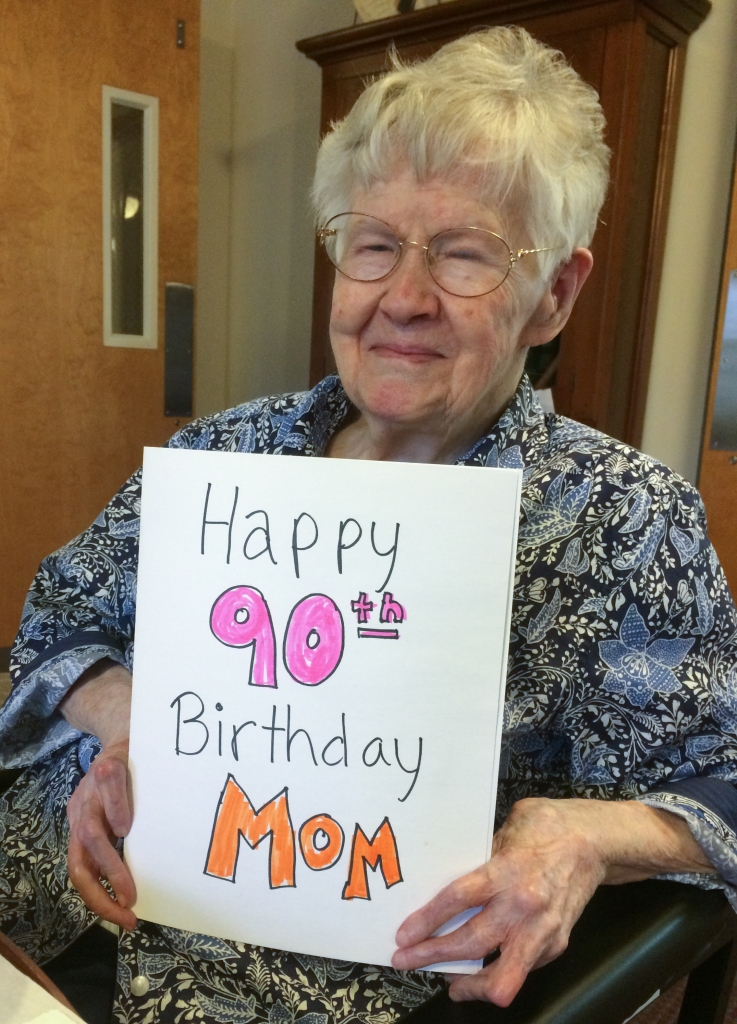
Reflections of a Hillbilly Woman
By F. Elaine Burke Seelhorst
January 12, 1927, 11pm. Thu wind was a-howlin’ round corners uf thu log cabin wif snow a-blowin’ betwixt cracks where I’s birthed. Ole Doc Meadows brought me in a-screamin’ like a-wildcat cause I had yeller jaundice.
Mom tried nursin’ but I couldn’t suck. I jest kep a-cryin’. [Mom told me about it many years later.] Next mornin’ Dad took Ole Doc Meadows home ‘n bought Mellon’s Food at thu drug store. Hit was my vittles fer one year or more.
Erwin Lewis Burke was birthed February 1, 1928, in thu three-room house Dad built fer ‘is growin’ fambly on his 50 acres Gran’pa Tobias Burke deeded ‘im.
Thu house was down hill from thu one-lane rutty dirt road. A-risin’ wind jest sent dust a-swirlin’ round thu hill. Hit’s barely wide enough fer a-jolt wagon [farm wagon].
Mom nursed Lewis fer a year. She jest couldn’t hep Dad in thu fields ‘n continue nursin’ Lewis. Tu wean ‘im, she dobbed mud on ‘er breast. Hit shocked ‘im ‘n ‘e quit.
Mom ‘n Dad traded their horses fer two sure-footed mules. Ole Joe was white ‘n Ole Bob was black, both essential fer our survival. When Dad hitched ‘em up tu thu mould-board plow, he put thu reins around ‘is right shoulder ‘n under ‘is left arm. To git ‘em a-movin, he’d say “giddy up.” To turn ‘em right, “gee” ‘n pull reins right, “haw” fer left ‘n pull reins left.
Dad took good ker uf ‘is mules, a-feedin’, waterin’ ‘n a-groomin’ ‘em. I’ve watched Dad remove worn-out horse shoes ‘n trim thu growin’ hoof. He’d heat thy new shoe red hot ‘n re-size hit tu fit thu trimmed hoof.
I’s a-cryin’ ’n a-cryin’. Dad tried tu hep me but my stummick jest hurt. I’s about two so I remember hit.
I’s called “Cotton Top” cause my hair was white.
Mom had tu keer fer me ‘n Lewis while she cooked vittles ‘n tended thu garden. She picked ‘n prepared beans, peas, shucked ‘n biled sweet corn. She made corn bread ‘n strawberry-rhubarb, cherry, or apple pie fer dinner.
High noon, Dad came from creek bottom tu et a lip-smackin’ dinner. Mom ‘n Dad had cheers but Lewis ‘n me had tu stand at thu table tu et.
We didn’t haf a clock, ‘n Dad’s old watch jest wore out. We could tell time by thu sun’s position ‘n thu shadows hit cast.
Mom worked hard a-pickin’ preparin’ ‘n cannin’ food fer winter. She picked sweet corn ‘n green beans. She pickled some uf thu beans ‘n canned ‘em. She canned tomato juice ‘n peaches. She made wild blackberry jam ‘n peach preserves ‘n canned ‘em. All canned food was stored in thu cellar under thu house fer winter.
Cannin’s hard work. Quart-size jars were used fer corn ‘n beans. Jars, zinc lids ‘n rubber sealing rings were sterilized on thu kitchen stove. Thu jars were filled ‘n put in thu big rectangular pot located down-hill on level ground. She put feed sacks betwixt thu jars ‘n covered ‘em wif water. She drew water from thu rock-lined well ‘n toted hit down hill ‘n covered thu jars. She built a fahr under thu pot. Beans ‘n corn had tu be kep a-bilin’ fer four hours. I’s about four years old ‘n Lewis ‘n me hep kep thu fahr a-burnin’.
At age five I washed jars ‘n hepped sterilize ‘em.
Mom shredded cabbage. She sprinkled salt on each layer as she pushed hit in a large, clean feed sack. She tied thu sack ‘n put hit in a size 15/20 crock. A clean, round, ‘eavy rock on top held hit down. Hit was stored in our cellar. [By the way, salt kills bacteria.] She may haf canned thu sour kraut.
In thu fall Dad picked apples ‘n put ‘em in a wooden barrel, sulfered ‘em ‘n stored it in thu smoke house.
Mom an Dad worked hard spring, summer ‘n fall tu haf essential vittles fer fambly, hay ‘n corn fer livestock. Lewis ‘n me hepped when we got older.
Corn was always planted in thu creek bottom. Seed corn was put in box on a “corn jobber” that let one er two seeds go in thu ground. Heavy rain in thu headwaters caused Tygart Creek tu rise ‘n cover thu corn plants. Hit had t’ be re-planted atter thu ground dried out. Hit was hard, back-breakin’ work. Corn was vital fer our survival. Pioneer livin’ ain’t fer faint-hearted folks.
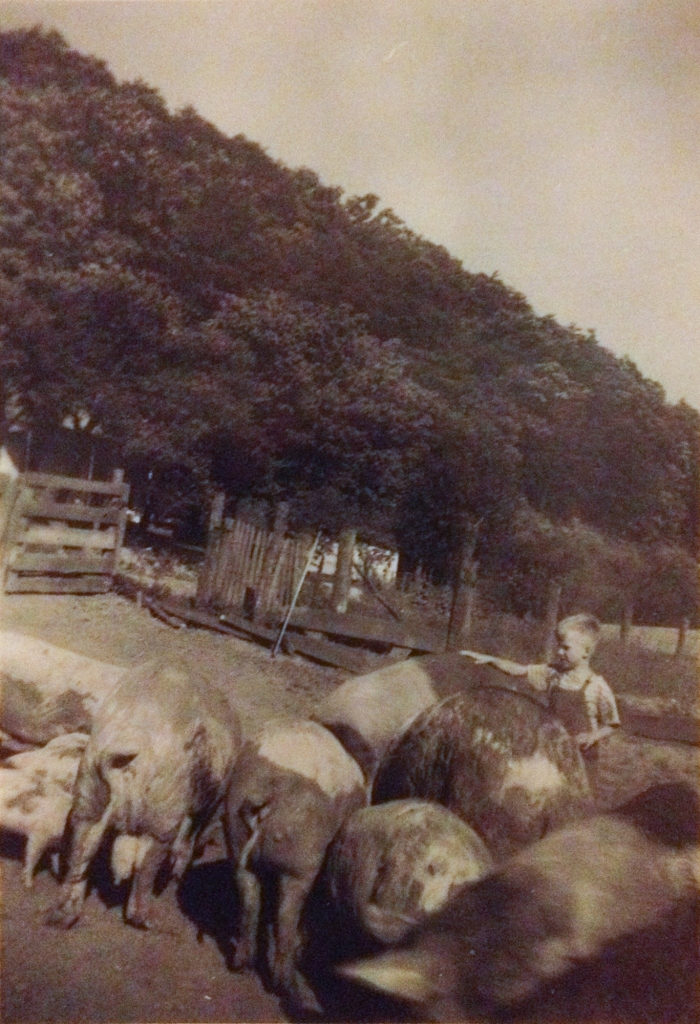
Dad had a-hernia ‘n had tu wear a truss. He worked hard anyway. Dad was deaf too but he could read lips.
Dad mowed hay, racked, stacked hit on jolt-wagon frame. He drove thu mules, Ole Joe ‘n Ole Bob, up thu steep hill tu thu level road all thu way tu thu hand-hewn log barn. Uncle Hobert pitched hay intu thu loft ‘n Dad moved hit back in place.
In late fall, Dad always butchered a big hog. All fat was rendered on thu kitchen stove. Part uf thu meat was ground up, made 1 1/2 inch sausage patties, fried ‘n packed in sterilized quart jars. Bilin’ fat was poured in jars around thu sausage, sealed ‘n stored in cellar. Dad hepped Mom do this fast-paced hot work. We et every part uf thu pig, even ears ‘n tail.
Dad put ham ‘n bacon in thu smoke house ‘n cured hit.
Gran’ma Sarah Jane Newsome-Burke jest didn’t like ‘er new daughter-in-law. She shore changed ‘er mind atter a-seein’ ‘er work beside ‘er man in thu fields.
Ye see, Mom had never worked hard on a farm. Mom’s thu youngest uf seven girls in thu Lewis fambly.
Mom went tu Normal School fer teachers, in Richmond, Kentucky. Dad went tu Normal School fer teachers in Morehead, Kentucky.
Mom moved tu Greenup County tu teach in a-two-room school where she met Dad. ‘E had a Chevy car ‘n went home atter school was out. Mom had tu board wif a nearby fambly. Mom traveled on ‘er horse. All thu Lewis fambly rode horses ‘n tuck good keer of ‘em.
Mom ‘n Dad married December 24, 1925.
Mom ast Gran’ma tu keer fer me an Lewis fer a-few days.
Gran’ma had picked a-bucketful uf wild blackberries. Thu Burke’s love pickin’ wild blackberries etin’ ‘em, cannin’ ‘n makin’ jelly ‘n jam, tu store in cellars fer winter etin’.
“Jest don’t give Cotton Top blackberries tu et cause she’ll git a-runnin’ off cause she has stummick trouble. Lewis can et some uf ‘em,” Mom said.
News came Ant Minnie Evans’ new house had burned. Thu fambily moved back intu thu dog-trot log house. Mom ‘n Dad ‘n all fambily members shared belongings wif Ant Minnie.
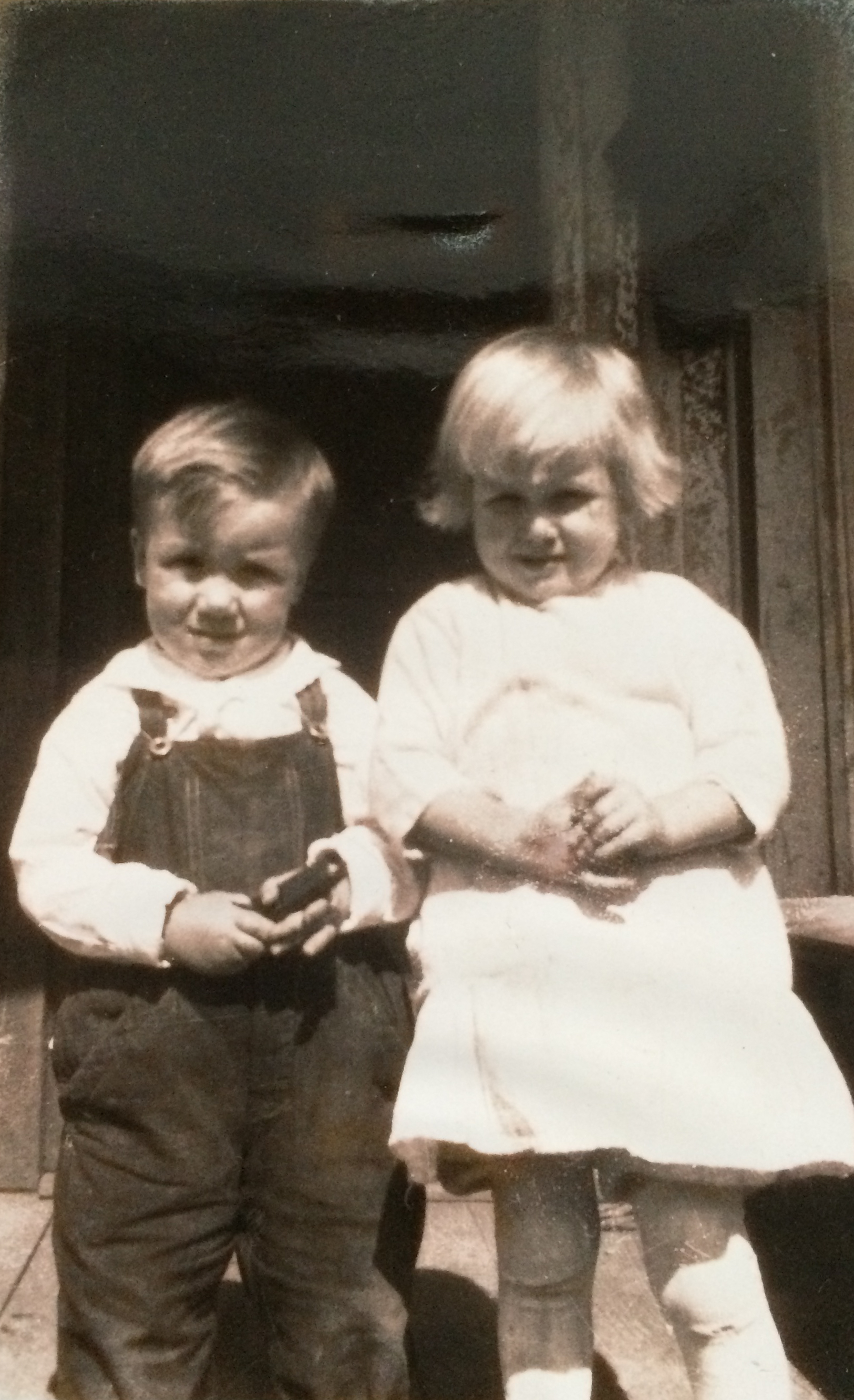
Ant Allie an Uncle Millard Lewis took me an Lewis home wif ‘em. Uncle Millard had a bigger car ‘n Dad’s. We shore liked a-ridin’ in thu back seat. Thu snow was deep but Uncle Millard did git home.
“Ant Allie yer house is real perty. Ye haf a-big front porch. In summer ye can sit tu see yer friends a-drivin’ by,” I said.
“Hits bigger ’n our house,” Lewis said. “Ye gotta a livin’ room wif a big davenport an three easy-sittin’ chears.”
“Oh! Ant Allie, ye gotta room wif a big table an cheers a-round hit,” I said.
“Hits a dinin’ room, where we et,” she said.
“We et in our kitchen a-standin’ up at thu table.” Lewis said.
“Ant Allie, ye haf two bedrooms,” Lewis said, as he bounced on one uf ‘em an messed up thu counterpane.
“Hit will be yer bed,” Ant Allie said.
Ant Allie had a big kitchen wif a sink. Hit had runnin’ water! We didn’t haf runnin’ water in our sink. We carried water from thu well. She had a-room next tu thu kitchen. Hit had a bathin’ tub.
“At home we git a bath in thu wash tub in our kitchen,” I said.
Ant Allie had a woman wash their clothes wif a washboard. She hangs ‘em on a clothes line tu dry an irons ‘em wif a-flat iron heated on kitchen stove.
“Hits hard work,” I said. “Mom has a-washer woman. She carries well-water downhill tu fill a-large iron kettle ‘n builds a-fahre tu bile thu water. She uses lye soap Mom makes tu clean dirty clothes.”
“Uncle Millard, I like y’er back porch don’t haf a roof,” Lewis said, as he rolled an rolled in thu snow. He got up lookin’ a-lettle bit like a snow man. Uncle Millard laughed an brushed thu snow clean off. He was real good tu Lewis.
We shore liked Ant Allie’s vittles cause they’re better ’n vittles we haf at home.
Ant Allie gave us a-job dustin’ thu furniture. We shore made hit shine.
Uncle Millard was a-givin’ Lewis a-bath.
“Allie, I jest cain’t git Lewis clean. I’ve scrubbed an scrubbed,” he said.
“Oh Millard! He’s clean cause he didn’t wear a shirt last summer an he got real brown,” Ant Allie said.
We stayed wif Ant Allie an Uncle Millard fer a long time. We shore liked a-livin’ wif ‘em. They liked us.
“Hits time fer ye tu go home,” Ant Allie said. Ant Allie an Uncle Millard was so good tu us we ast tu stay wif ‘em.
“No, cause yer Mom an Dad want ye tu come home,” Ant Allie said. She put one uf ‘er counterpanes in a special sack fer us tu give Mom.
Thu snow was deep but Uncle Millard’s big car did git us home.
Dad opened thu door fer us. We saw Mom a-sittin’ in thu chear a-holdin’ a wrapped up bundle.
“Mom, yer holdin’ somethin’. What is hit?” I ast.
Mom showed us a baby.
“Mary Jane is yer baby sister come tu live wif us,” she said.
“Mom, how did she git here? Why didn’t ye tell Lewis an me ye was bringin’ a baby?” I ast.
Mom jest didn’t answer. Dad was quiet too.
Ant Allie didn’t say a word. She took thu baby from Mom, kissed ‘er an walked tu thu kitchen a-talkin’ tu ‘er. She came back, handed Mom thu baby. She gave Mom thu counterpane fer ‘er bed. Mom was so glad tu get hit.
Ant Allie an Uncle Millard left fer home cause thu snow was gittin’ deep.
Mary Jane Burke was birthed January 18th, 1930.
Thu snow was real deep. Hit covered thu fruit trees around thu house. Thu world looked clean an bright.
Mom gave ‘er clean dishpan tu Dad an ast im tu git clean snow in hit. She stirred in cream an sugar. She called hit snow cream. Hit shore was good. Mom always made snow cream every winter when snow was deep an clean.
Lewis an me watched Dad shovel snow tu thu well an all thu buildin’s. After feedin’ cows an mules he led ‘em tu thu water tank an broke thu ice. They emptied thu tank an Dad had tu draw more water from thu well. Dad an thu animals went back in thu barn. He milked thu cows an gave thu barn cats some. He brought a large bucket uf warm-foamy milk tu thu house. Hit was cold hard work that had tu be done. Dad was real strong an had always worked hard. Pioneer farming ain’t fer faint-hearted folks.
Mom always strained thu milk an put hit in a big crock tu let cream rise. A lettle uf thu heaviest cream was skinned off an thu milk was poured in Mom’s churn. When hit was ready she churned thu milk an cream intu butter. We drank delicious buttermilk. Mom made cat heads [biscuits] an’ corn bread wif hit. She pressed butter intu a mold. In warm weather thu butter was put in buckets an lowered in thu water well tu cool. Hit was taken tu thu grocery store an sold or traded fer items Mom or Dad needed.
Our livin’ room had a stove that burned wood tu keep us warm but hit would be cold at night if thu fire went out. Mom’s cook stove was at thu far end uf thu kitchen.
Mom ast Gran’ma Burke tu keer fer Mary Jane while she hepped Dad plant corn.
Lewis an me were a-sittin’ on a pallet under a tree next tu Reuben Potter’s fence where Mom had left us. Hit was fur above thu creek bottom where they worked.
Lewis an me saw a man a-walkin’ down thu jolt wagon-sized long road. He had a long silky-white beard.
“I’m yer Gran’pa Lewis,” he said.
He picked us up wif hugs an kisses. I pulled ‘is beard. He didn’t mind cause he jest laughed. I fell in love wif ‘im cause he liked us. We needed to be loved by our Gran’pa Lewis.
Mom looked up, saw ‘er dad an ran back up thu long hill tu greet ‘im.
Gran’pa Elisha M. Lewis rode ‘is horse a-fur piece from ‘is home on Horton Flats at Bruin, Kentucky. Gran’pa had two hickory-bark-bottom chears he made fer Lewis an me. [I still have one of them.]
Gran’pa took keer uf us while Mom an Dad finished a-plantin’ corn. Gran’pa Lewis told us stories an played games wif us. Hide-an-seek was our favorite. We shore wished he could live closer tu us so we could visit wif ‘im.
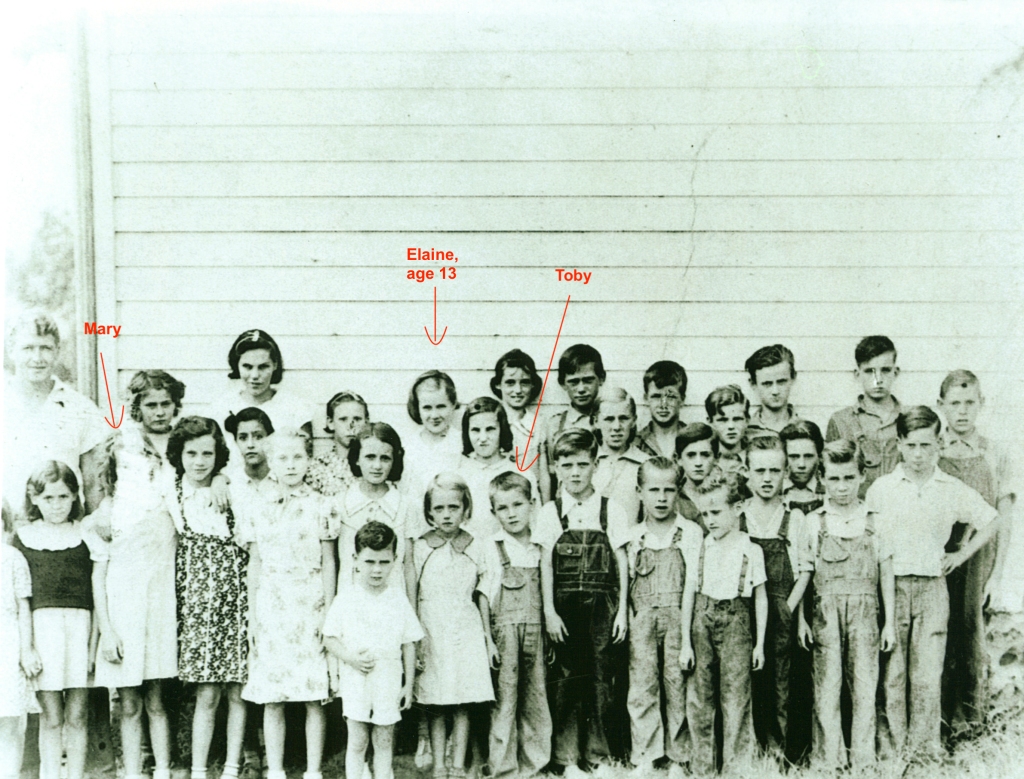
Sunday mornin’ Mom an Grand’pa took us tu-meetin’ wif ‘em at Mount Olive Church jest down thu road a-piece. Atter a-while Lewis jest had tu go. “Mom, ken I go pee?” he ast.
“Yep,” Mom said.
Thu Regular Baptist preacher said, ”Praise God all ye sinners.” Suddenly, a lettle voice was heard outside.
“Glory be tu God all ye sinners! Praise God!”
Hit was Lewis! He repeated hit as h’ ran around thu church. He was a-runnin’ fast as ’is lettle legs could carry ’im around thu church buildin’. Mom jumped up tu go git ‘im. She ketched ‘im as he reached thu corner.
Atter laughter died down, thu preacher said, “Ye’ll be a preacher some day.” He finished ‘is sermon askin’ sinners tu come forward. Nary a one jined thu church.
Thu preacher an choir are on a-raised platform. Thu preacher stands in thu middle wif a stand fer ‘is Bible. There’s two rows uf benches on ‘is left fer men an two rows uf benches on ‘is right fer ladies. Thu men’s leader stands up an “lines” thu first line uf thu song. Thu choir “surges” that line uf thu song. Each line is spoken an hit is surged until thu song is complete. Usually hits a beautiful mournful sound.
Thu Preacher closed wif a prayer. Folks shook neighbor’s hands an slowly left fer home.
Young men were a-hangin’ around outside thu church. I s’pect they wanted tu ketch thu eye uf a-perty gal.
Next mornin’, a-fore sun peeped over thu east hill an dew had laid thu dust, Gran’pa kissed us goodbye. He saddled ‘is black horse an headed south fer home wif us a-wavin’ bye ‘til he was out uf sight.
We never saw ‘im again. H’ died wif kidney infection in 1931.
Lewis an me never wore shoes during spring, summer an late fall. Our feet would get awful cold early mornin’ when we had tu bring Ole Betty an Ole Jersey from pasture to be milked. Lewis was so cold, he would lie down where Ole Betty got up tu git warm. I would stand on Ole Jersey’s spot to warm.
Mom liked tu cook. She liked makin’ vittles fer us tu et. She was always a-singin’ thu Baptist songs she loved as she cooked. Fer breakfast she baked cat heads [biscuits], sliced ham from thu smoke house, an red-eye sop [gravy]. Dad liked bacon an fried eggs cause he worked very hard. They sold thu eggs cause they needed thu money.
Dad ordered baby chicks. They came tu thu post office in a big box. He bought a brooder tu kep ‘em warm, fed an watered ‘em til big enough tu turn loose in a woven-wire fence chicken yard. He fed an watered ‘em til they grew tu fryer size. Mom an Dad dressed ‘em fer market. He got good price fer ‘is plump fryers. Some uf thu chickens grew up tu lay eggs. We had fried chicken too.
I kep a-hearin’ ‘em talk about a depression. I didn’t know what hit was. I reckend hit meant money tu buy things. Hit was hard tu git.
“Mom, what’s thu big bird wif two wings a-flyin’ over thu hills. Hits got a loud ugly song. Hit ain’t a bit perty like all our other birds.”
“Oh, Cotton, hits not a-bird. Hits a airplane wif government men a-lookin’ fer stills. They’re Revenours a-lookin fer smoke a-risin’ above thu trees tu ketch men a-makin hooch,” she said.
Lewis an me went a-lookin’ fer guys a-makin’ hooch ‘cause thu airplane flew over our hill. We had trouble a-climbin’ thu hill. Hit was wet an slippery cause uf a chunk-washer. [Heavy rain]
We walked across thu hill tu Uncle Walter’s farm. He rented thu cabin I’s birthed in tu ‘is friend.
“Lewis, do ye hear talkin’?” I ast.
“Yep,” he said.
We laid down on slippery leaves so we wouldn’t fall over thu hill. Wigglin’ tu thu edge we peeped over an saw two guys wif a fahr under a barrel. Branch water ran down to it.
“Hits shore funny lookin’,” I said.
“Cotton, let’s mess their water,” Lewis said.
Our bare feet did hit. We peeped over an watched muddy water run down thu branch. Thu two guys came a-lookin’ fer us, a-cussin an a-runnin’ a blue streak. We ran home a-slippin’ an a-sliddin’ down thu hill tu home. We got wet an muddy.
We told Dad did what we did.
“Hit was dangerous! Don’t go a-lookin’ fer any more men a-makin’ hooch,” he said. Uncle Walter lost ‘is renter.
Gran’pa Tobias Burke got a farm on Grays Branch, Kentucky. Hit was a big well-built house that faced Route 23. Hit had a big barn, a smoke house on top uf a cellar, a coal house an a big garden an lots uf fruit trees. Best of all it had a giverment-built privy a long way from thu house.
A large built-up railroad was about a half-mile north an they could see large coal an passenger trains a-rollin’ by whenever they had time to sit on thu front porch in summer. They could see thu Ohio hills, but they couldn’t see thu Ohio River cause thu built-up railroad tracks hid thu view.
Mom, Dad, an Uncle Hobart hepped Gran’ma an Gran’pa move. Hit was a-lot uf hard work. Mom cleaned thu home place atter hit was emptied.
Atter he moved, Gran’pa rented thu home place tu folks named Butler an Marian Bleu. Mr. Bleu worked thu night shift at Wheeling Steel in New Boston, Ohio.
“Will you let Elaine stay with me at night because I’m a little afraid to be alone?” Mrs. Marian asked Mom.
“I’ll let ‘er but ye must walk her home when Butler comes home early,” Mom said.
I shore liked stayin’ wif ‘er. Mrs. Marian was so good tu me. I et store-bought vittles wif ‘er.
“Hit ain’t like thu vittles we et at home,” I said.
Mrs. Marian was real good tu me. I liked stayin’ wif her.
Mrs. Marian gave me a perty doll. Hit was stuffed wif straw. She bought toys fer all of us. We only had homemade wood-stick toys.
Mrs. Marian asked Mom tu let her adopt me. Mom said, “No, we need ‘er at home.”
Mom an Dad let me go wif Mr. an Mrs. Bleu to the Wheeling Steel Union Rally in New Boston, Ohio. Hit was a loud, noisy place an some guys got real mean an fought wif each other.
Mrs. Marian moved away from ‘em an bought hot dogs an pop. Hit shore was different vittles. Atter thu rally was over we went home.
Lewis wanted tu hear all about the rally an I ‘splained hit tu ‘im. “Gosh, why did they fight?” he ast.
“They yelled, ‘Yeller Dogs!’ an started a-hittin’ ‘em,” I said.
Thu sun set beyond thu creek against thu western hill castin’ a reddish-yellow glow back tu me. I liked tu sit on thu lettle back porch an listen tu night sound as dusk descended. Hit was music tu my ears. Thu screech owls, thu hoot hoot hoot uf big owls. I loved a night bird singin’ “Un-cle Rip, Un-cle Rip” as hit called tu others. Thu possum a-scramblin’ up thu bank wif ‘er babies on ‘er back. Bats flyin’ tu catch insects. Crickets a-calln’ an lettle frogs a-peepin’ in thu ditch above thu road.
First time I heard “Un-cle Rip,” I went back in thu house an said, “Mom, hit says “Un-cle Rip, Un-cle Rip.”
“Yes,” she said, “Hit’s a Whip-por-will.” I never did see one uf ‘em cause they’re shy evening ground birds
Uncle Hobert’s fifty acres was north uf Dads. Uncle Hobert was married tu Myrtle Potter. Ant Myrtle had a new baby about every year. He was a happy man. I remember Loretta an Fred. They had so many youngins I can’t recall thu names.
‘Is house overlooked Dad’s creek bottom. We could look up thu bank an see our cousins a-playin’ in thu front yard.
Uncle Hobert had several foxhounds. ‘E hunted fox wif others every Saturday night. I loved tu hear hunters’ horns a-blowin’. Thu dogs could be told what tu do by their master’s horn. They ain’t perty dogs but they shore are smart.
News came that Gran’pa Lewis had died. Hit gest broke our hearts. Our fambly, and Ants Allie, Hattie, and Bertha, went tu ‘is Horton Flats home as fast we could. We met Gran’ma Sarah Jane Johnson Lewis cried an cried wif grief.
Gran’pa was on ‘is bed. A white cloth covered ‘is face.
I went wif my cousins tu git old-fashioned roses tu put a-top ‘is wooden coffin.
Neighbors had built ‘is coffin an dug ‘is grave. Thu bottom an all four sides uf thu grave were lined wif logs.
Thu Baptist choir sang Gran’pa’s favorite hymns. Thu preacher said thu last words ever uttered fer Gran’pa Lewis.
Men used their horses’ check lines tu lower Gran’pa’s coffin in thu grave. After kinfolks left they filled thu grave. They tamped thu earth down. We went back later and covered Gran’pa’s grave wif roses.
Gran’ma Lewis went home wif Ant Ally. They went back later. Thu farm was sold an plunder divided or sold.
Ant Marj sent Mom Ladies Home Journal. She was Col. Jack Burke’s wife. They lived in Buffalo, New York. They had two sons, Toby an Eddie. Ant Marj sent us clothes ‘er boys outgrew. She sent other things too. Ant Marj was a beautiful kind lady.
Dad’s footlocker was between our beds. I was curious.
I said tu Lewis, “Hep me open hit.”
We found a rolled up rubber thang. “Hits a balloon,” I said. After unrollin’ we tried a-blowin’ hit up but we couldn’t.
“We better put hit back jest like hit was cause Dad would git mad.” I said. We closed thu footlocker ’n left.
Mom had a Singer pedal-powered sewing machine. She made feed-sack dresses an bloomers fur me an white shirts fur Lewis. Mom never used a pattern but she had newspapers tu cut patterns tu fit. Hit’s jest natural fur ‘er. She made a perty pink sack dress fur me.
We went a-visitin’ Ant Bertha Riggs, ‘er rich sister.
Mom said, “Don’t tell ‘em hit’s made outta feed sacks. Hit’ll be our secret.”
I marched right in showin’ off my purty-pink dress ‘n said, “See my purty feed-sack dress!”
My three cousins doubled-up a-laughin’. I cried.
Ant Bertha sent ‘em tu their rooms. They had separate rooms ‘n beds were kivered wif counterpanes.
Our family had one bedroom wif a double bed fur Mom an Dad. Lewis an me had thu other ‘un. We had a feather bed on top uf bed-size sacks filled wif corn-husks that laid on boards. The outer cornhusks were disposed uf. Husk next tu thu corn was saved fer our beds.
Mom was always a-singin’ religious songs while she cooked our vittles. She could whip-up cat heads faster’en most any woman. Men never cooked ‘cause hits woman’s work! Mighty strange! Women worked in thu fields wif thu men but hit wasn’t called men’s work.
Me and Lewis went bare footed from early spring ‘til frost. Dad didn’t haf money tu buy summer shoes. Our shoes came from second stores.
Barefoot Lewis and ‘is dog, Ole Bowser, was jest a-strollin’ in the meader a-tryin’ tu stay away from green briars. Suddenly, Bowser started a-diggin’ in a hole. Lewis hepped ‘im dig. Dirt was a-pillin’ up, and all uf a-sudden a Polecat let go wif a blast. Lewis and Ole Bowser ran fur their lives wif stingin’ eyes and smellin’ like a Polecat.
Mom bathed Lewis with tomato juice. Ole Bowser crawled under thu house but we rolled ‘im outen there an ’e got a-tomato juicn’ too. Mom doctored Lewis’s scratched feet. She buried ‘is clothes in thu ground fur four days ‘til thu smell left.
“Lewis, a-diggin’ in a polecat hole jest ain’t a smart idea,” Dad said.
(c) 2018 F. E. Seelhorst


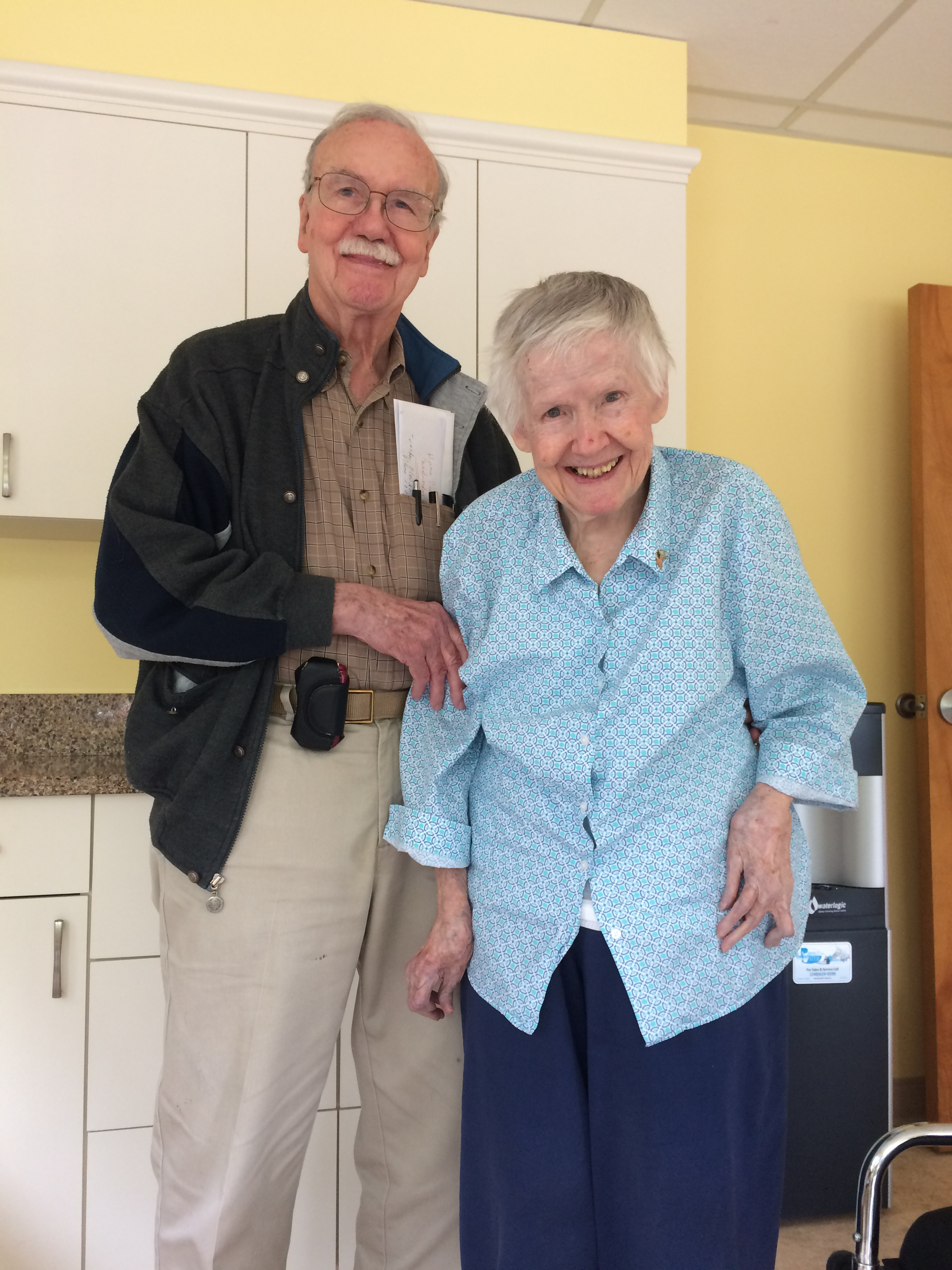


It was fun reading Aunt Elaine’s story of life on the farm. Thank you for sharing it, Mary.
LikeLiked by 1 person
[…] My mother was raised on a family farm in Eastern Kentucky and knew about plowing with mules the same way I know about using typewriters: she grew up with it. She stood there quietly for a few minutes. […]
LikeLike
[…] a vocational school, intending to stay in Kentucky and farm. He got married in 1951. He and my mom wanted to start a dairy farm, but such an investment was beyond their ability. So instead, mom […]
LikeLike